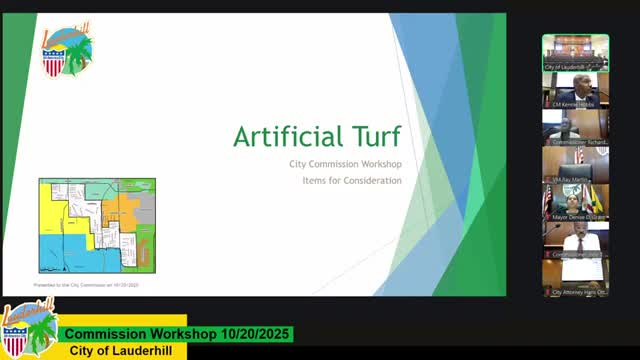Lauderhill staff review state changes on artificial turf; city to draft local standards
Get AI-powered insights, summaries, and transcripts
Subscribe
Summary
Staff briefed commissioners on recent state action limiting local prohibitions on artificial turf and on the trade‑offs between synthetic turf and natural landscaping. Staff recommended drafting local rules to align with state law while managing drainage, heat and aesthetics.
Lauderhill staff presented background and policy options for artificial turf after recent state legislation limited local governments’ authority to ban synthetic turf on residential properties.
Daniel (planning) told the commission the city’s current practice has been to allow artificial turf in rear yards with administrative review; he said a recent change in state law and draft Department of Environmental Protection rules now prohibit outright local bans in residential areas and require local governments that allow turf to adopt standards. "The law prohibits cities from prohibiting artificial turf in residential area[s]," the city attorney summarized.
Staff outlined environmental and technical tradeoffs. The city cited the Florida Friendly Landscaping guidance, which does not list synthetic turf as a ‘‘Florida‑friendly’’ product and notes that turf can increase local surface temperatures and may reduce natural groundwater recharge if installed on compacted substrates. Staff said many turf systems are permeable but that installation methods (compacted base, limited drainage) can reduce permeability and increase runoff.
Residents and stakeholders offered both support and concern. A homeowner who installed turf described engineered underlayments, drainage performance and ‘‘cool yarn’’ fibers that reduce surface heat and said quality installations can meet stormwater goals. Other speakers and several commissioners stressed potential increases in runoff, maintenance and enforcement burdens if turf is widely allowed without clear installation standards.
Staff recommended a measured local response: amend the land‑development code to conform with state law, continue to allow turf in rear yards under specified conditions and adopt performance‑based standards (limits on coverage, permeability/installation specifications, setbacks, product quality and maintenance requirements). Several commissioners asked staff to research other cities’ rules, the draft DEP standards and to return with proposed code language and enforcement language. The city attorney said the city could hire outside counsel for any special legal work but confirmed the city cannot adopt an outright prohibition at this time.
Ending: Commissioners asked staff to draft code amendments that would align local rules with the new state requirements and address drainage, heat and enforcement; staff will return with proposed language and an analysis of other municipal standards and DEP draft rules.
